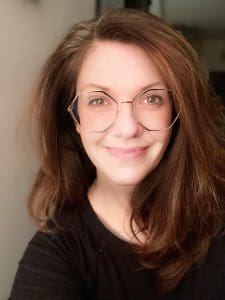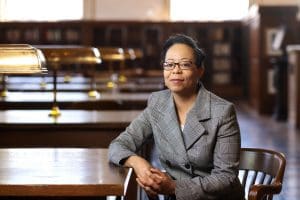March 19, 2021
Day/Time: Thursday, May 13, 2:45 PM to 3:45 PM
Beyond the “new normal”: a speculative reconsideration of undergraduate publishing
Presenter:
- Dana Ospina, California State University, Dominguez Hills
Description:
Amidst the isolation and uncertainty of COVID-19, many of us fortunate enough to continue to be employed have perceived an expectation, stated or not, to maintain established levels and models of productivity, despite the fact that we and our communities are often struggling to determine how to move forward and continue to adapt to shifting psychic and physical circumstances. While platforms like Zoom provide a way to continue performing many of the procedural aspects of our work, less quantifiable aspects of productivity have receded. I, a solo practitioner developing and managing an emerging, modest library publishing program focused primarily on undergraduate publication, have, like many others, experienced disruptions to processes and productivity. But within these delays and obstacles—and in fact because of them—I have found myself motivated to contemplate a future in which the program I oversee assumes an unorthodox disposition, both in mission and practice, allowing it to extend its reach beyond the boundaries of traditional academic publishing paradigms.
This presentation does not presume to provide answers, but rather begins the work of exploring and sharing possibilities for such a program through the depiction of several speculative scenarios. Employing strategies and models of speculation borrowed from other disciplines (design, fiction, architecture), I propose a notional re-conception of my program which, while continuing support for traditional publication styles and processes, additionally prioritizes incorporating an expanded set of practices. If a speculative mindset offers a means to train one’s perspective away from established norms and expectations and toward the consideration of imaginative ideas and potentialities, I suggest it is a worthwhile exercise to envision a library publishing program that is responsive not only to institutional and academic protocols and expectations, but also to the shifting desires, circumstances, and needs of the community it serves and who sustain its relevance.
Developing Open Access Journals using OJS: Best practices maintaining, promoting, and growing your portfolio of student-run academic journals
Presenter:
- Gabe Feldstein, Boston College
Description:
Since the beginning of the COVID lockdown BC libraries has seen an increased interest in Open Access E-Journals on OJS. Three new journals have joined the platform since the beginning of the lockdown as physical printer and publication workflows have become more uncertain. While many young editorial teams can struggle to establish a journal, focusing on indexation, setting up DOIs, and international growth have helped guide our student journals towards consistently relevant publication in their disciplines.
Additionally, analyzing the usage of the Open Access Publishing Funds available at BC has shown increasing interest in publishing open access in Nursing, Physics, and other hard sciences which are generally less represented by our portfolio. Recently, we have welcomed BC’s Medical Humanities Journal to the electronic platform – further expanding the disciplinary scope of the ejournals hosted by the library. As of now, our 20 journals have been downloaded in over 208 countries, which is a statistic itself that inspires our editorial teams to think very broadly about audiences for their journal not only outside of the BC community but as a part of the international community.
Featuring our student journals in a biannual newsletter has also been a great way to highlight the best practices used by some of our most advanced student journals. This also will preserve these practices across editorial teams transition over the years through graduations. By providing resources and being direct and straightforward about some aspects of what it means for the journal to make progress, we have been able to encourage continued interest in publishing open access.
Adapting Podcasts to a Digital Humanities Practice
Presenters:
- Corinne Guimont, Digital Scholarship Coordinator, Virginia Tech
- Joe Forte, Digital Humanities Specialist, Virginia Tech
Description:
In early 2019, a group of Digital Humanities (DH) librarians at Virginia Tech (VT) created a DH Status Report that examined existing services and departments supporting DH in the Libraries, and made recommendations for growth to fit faculty and student needs. Among others, it identified media production as a potential growth area, specifically the production of audio recordings for podcasts, oral histories, and other multimedia projects.
A key stakeholder in the Libraries’ support for DH at VT is the College of Liberal Arts and Human Sciences (CLAHS), who partners with the Libraries and Virginia Tech Publishing (VTP) in the administration of the Athenaeum, an adaptable suite designed to support digital scholarship and pedagogy in the Library, which includes a small recording studio. Concurrent with the DH Status Report, VTP was hiring an Athenaeum Coordinator. Given the recommendations of the DH report and the needs of CLAHS faculty and students, VTP chose to fill this position with the intention to expand media production capabilities and support.
Beginning in December 2019, the new coordinator prioritized the creation of a podcasting initiative. This meant outfitting the studio with furniture and technology sufficient to address the production needs of the several podcasting teams he was simultaneously guiding thorough development. The idea was to build a community of creators orbiting a physical production space and knowledge base of development resources. However, just as everything was in place and starting to ramp up, we were sent home.
In this presentation, we will detail a case study of the podcasting initiative, including its inception, early achievements, and challenges presented by an unexpected and prolonged period of remote operation. Additionally, we will show how adapting to those circumstances evolved and strengthened the reach and merit of the initiative, as well as providing opportunity to deepen partner relationships.

